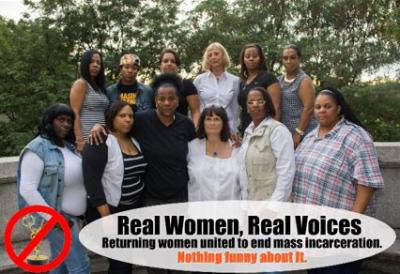Former Prisoner: "Orange Is The New Black" Is Not Funny
The Netflix series "Orange is the New Black" isn't funny to the women who served time in Danbury Federal Prison. I know because I am one of those women.
The day after Monday's Emmy Awards, a television morning show invited viewers to tweet about their favorite part of the awards ceremony. I don't tweet. But if I did, I would have said that my favorite part was that "Orange is the New Black" didn't win an award for best comedy. And it shouldn't have.
Take it from me, prison life isn't funny. Nor is it anything like the comic-book portrayal of prison as exemplified in the Netflix rendition. I spent 15 years in the federal prison system, mostly at the Danbury Federal Prison Institution and the Federal Prison Camp. Unfortunately, I know what "real" prison is like. It sure isn't what non-incarcerated viewers were led to believe by their weekly diet of Netflix's prison caricature.
The public should know the picture painted in "Orange is the New Black" is painfully far from the truth.
Let's start with the visiting room scenes. The series shows a visiting room where prisoners and their families sit and chat happily. The reality? No tables. Chairs spaced in tight rows so that you need to lean over to speak to each other. Moms and children crying. Visits being cut short when the room gets crowded.
Many of the segments of the series are filled with same-sex sexual escapades that take place in unrealistic scenes throughout the prison. Sure, same-sex sexual activity does happen in prison, but most participants are in a sincere relationship, not just looking for quick sex. Same-sex couples risk being banished to the punishment of the special housing unit, or sent to different prisons to be separated.
Nowhere in the Netflix rendition of prison do we see the real-life collateral consequences that women and their children face when mom is incarcerated. Most of the women with whom I was in prison were nonviolent, low-level drug offenders. Nevertheless, many of these women lost custody of their children because of the draconian length of mandatory drug sentences.
If you haven't been to prison, can you even imagine how it feels to lose your children when you're locked behind bars and can't do anything to stop it? Is this a justifiable part of your sentence? To lose your children forever because of our nation's failed war on drugs? Does our society really want to be this cruel? It seems that the "Orange is the New Black" folks forgot to include this bit of truth in their storyline.
There is only one main character in the entire Netflix series who has a serious illness. Strange, because while I was at Danbury prison, at least six women died within one seven-month period — either at the camp, or shortly after being banished to Carswell, a federal prison medical center for women in Texas. To the prisoners, it seemed clear that with timely action their medical problems were treatable; their deaths unnecessary.
One woman I knew was sent to prison for a monthlong sentence. She was on an oxygen machine. One night women in her dorm pleaded with the officer to call a physician assistant because the woman was having trouble breathing. When the PA finally arrived, he chastised the women for using too much oxygen from her tank, and left. The woman was found dead in her bunk the next morning.
The media and its public seem to be mesmerized by "Orange is the New Black." Sadly, their fascination with this comic-book prison ignores the real women whose lives are inaccurately, and insensitively, portrayed. For this reason, those of us who know the true story have banded together to create a group called Real Women, Real Voices. The members of this group are women who have been incarcerated at Danbury, including some who are featured in Piper Kerman's accurate book on which the series is based.
Real Women, Real Voices was created to tell the truth about what it's like to be a woman in prison. Will the media listen to us? Maybe not. But, then again, maybe yes. It's time.
By Beatrice Codianni September 3, 2014
Beatrice Codianni of New Haven is the managing editor of Reentry Central, an online news source for criminal justice reform. Codianni and Andrea James, author of Upper Bunkies Unite and cofounder of Families for Justice as Healing, were instrumental in the creation of Real Women, Real Voices.

